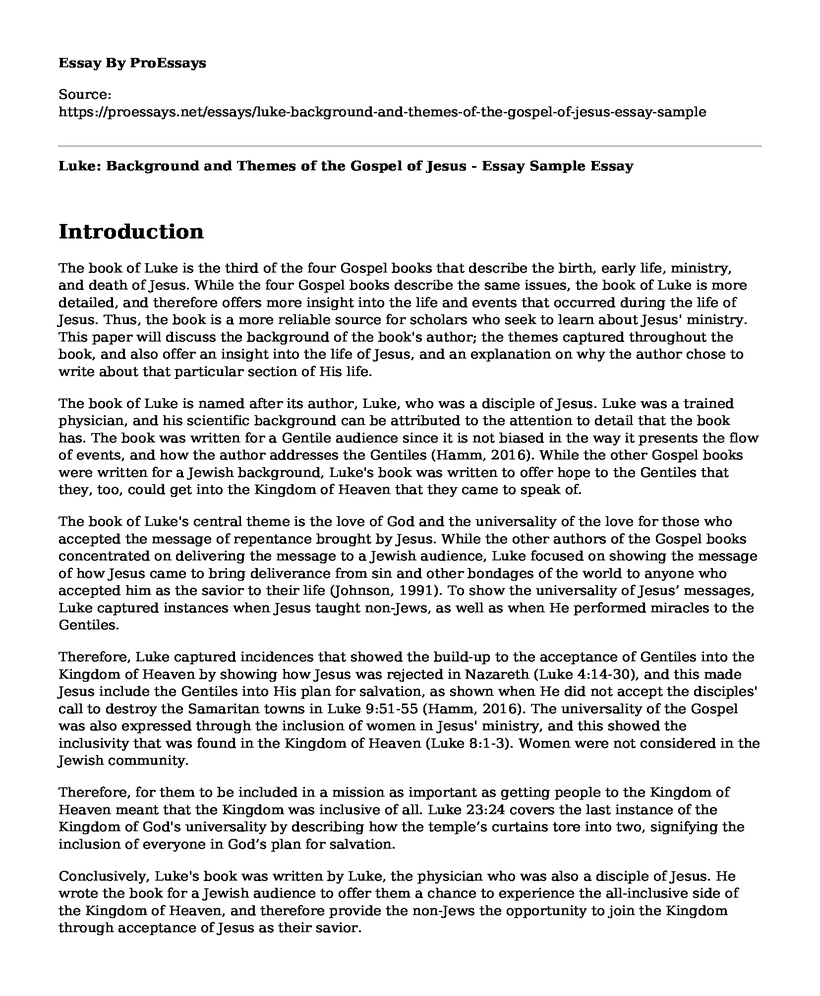Introduction
The book of Luke is the third of the four Gospel books that describe the birth, early life, ministry, and death of Jesus. While the four Gospel books describe the same issues, the book of Luke is more detailed, and therefore offers more insight into the life and events that occurred during the life of Jesus. Thus, the book is a more reliable source for scholars who seek to learn about Jesus' ministry. This paper will discuss the background of the book's author; the themes captured throughout the book, and also offer an insight into the life of Jesus, and an explanation on why the author chose to write about that particular section of His life.
The book of Luke is named after its author, Luke, who was a disciple of Jesus. Luke was a trained physician, and his scientific background can be attributed to the attention to detail that the book has. The book was written for a Gentile audience since it is not biased in the way it presents the flow of events, and how the author addresses the Gentiles (Hamm, 2016). While the other Gospel books were written for a Jewish background, Luke's book was written to offer hope to the Gentiles that they, too, could get into the Kingdom of Heaven that they came to speak of.
The book of Luke's central theme is the love of God and the universality of the love for those who accepted the message of repentance brought by Jesus. While the other authors of the Gospel books concentrated on delivering the message to a Jewish audience, Luke focused on showing the message of how Jesus came to bring deliverance from sin and other bondages of the world to anyone who accepted him as the savior to their life (Johnson, 1991). To show the universality of Jesus’ messages, Luke captured instances when Jesus taught non-Jews, as well as when He performed miracles to the Gentiles.
Therefore, Luke captured incidences that showed the build-up to the acceptance of Gentiles into the Kingdom of Heaven by showing how Jesus was rejected in Nazareth (Luke 4:14-30), and this made Jesus include the Gentiles into His plan for salvation, as shown when He did not accept the disciples' call to destroy the Samaritan towns in Luke 9:51-55 (Hamm, 2016). The universality of the Gospel was also expressed through the inclusion of women in Jesus' ministry, and this showed the inclusivity that was found in the Kingdom of Heaven (Luke 8:1-3). Women were not considered in the Jewish community.
Therefore, for them to be included in a mission as important as getting people to the Kingdom of Heaven meant that the Kingdom was inclusive of all. Luke 23:24 covers the last instance of the Kingdom of God's universality by describing how the temple’s curtains tore into two, signifying the inclusion of everyone in God’s plan for salvation.
Conclusively, Luke's book was written by Luke, the physician who was also a disciple of Jesus. He wrote the book for a Jewish audience to offer them a chance to experience the all-inclusive side of the Kingdom of Heaven, and therefore provide the non-Jews the opportunity to join the Kingdom through acceptance of Jesus as their savior.
The Kingdom of heaven was open for everyone, including those sidelined by the Jewish society, like the women and children. This is the basis on which modern Christians associate themselves with Jesus Christ and hope to join the heavenly Kingdom He promised His disciples.
References
Hamm, D. (2016). The Importance of Being Samaritan in the Gospel of Luke.
Johnson, L. T. (1991). The Gospel of Luke (No. 3). Liturgical Press.
Cite this page
Luke: Background and Themes of the Gospel of Jesus - Essay Sample. (2023, Aug 21). Retrieved from https://proessays.net/essays/luke-background-and-themes-of-the-gospel-of-jesus-essay-sample
If you are the original author of this essay and no longer wish to have it published on the ProEssays website, please click below to request its removal:
- Essay Sample on Humanistic, Existential and Spiritual
- Spirituality in Hospice and Palliative Care Essay
- An Exposition of Foundationalism and Essentialism Essay
- The Development of Buddhism and Its Influence to Vietnamese Society Throughout History Essay
- Organization of Buddhism Structures and Sects Essay
- The Rise of Christianity: From Judaism to 2 Billion Followers - Research Paper
- Essay Example on Women in Buddhism: Debates, History, and Feminism







